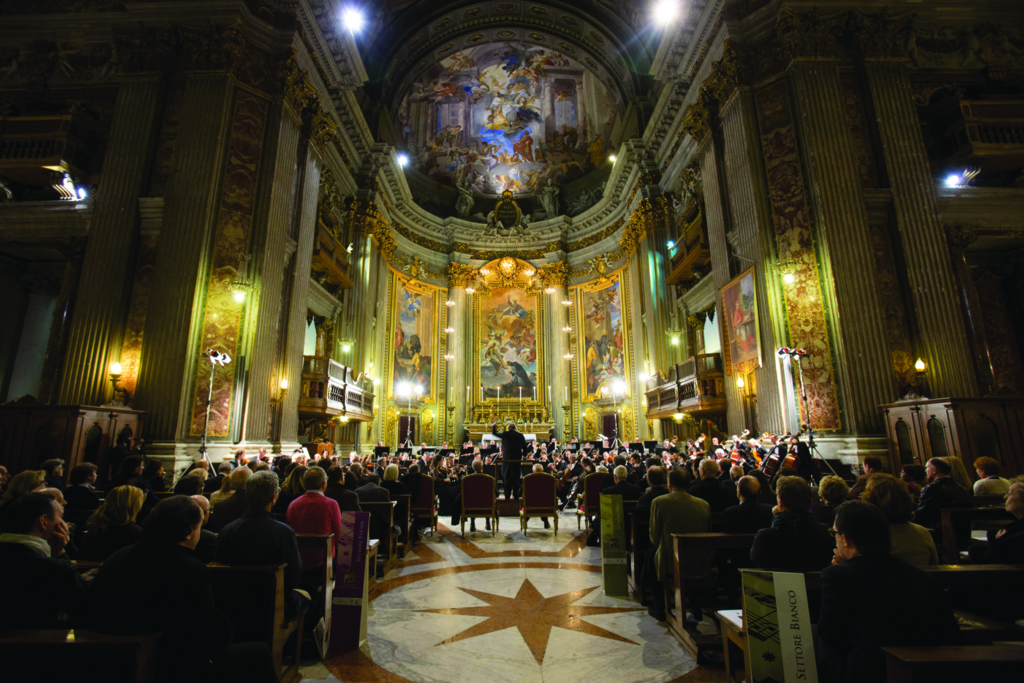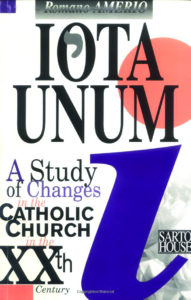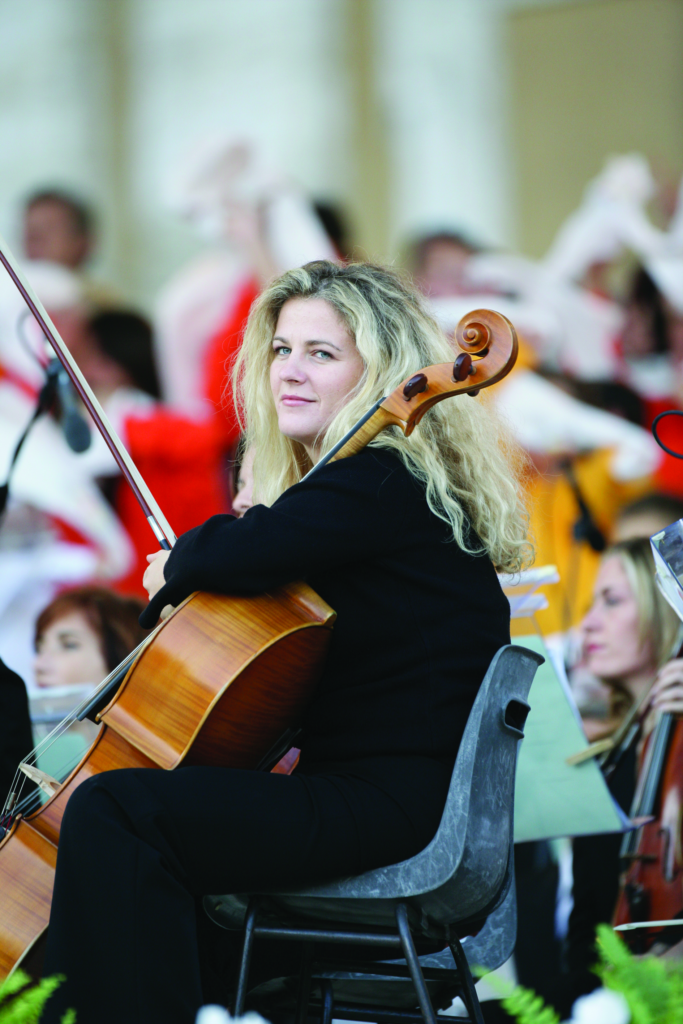Clarifying the difference between an imposed “pop” music and a music truly “of the people” and their religious heritage
By Maestro Aurelio Porfiri

Rome, Basilica of Sant’Ignazio di Loyola in Campo Marzio. XI International Festival of Sacred Music and Art

Romano Amerio’s book Iota Unum. A critical study of pre- and post- conciliar Church changes. The wise Confucius invites us to reflect on the importance of the meanings of the names of things. “Change” is not necessarily “progress”
Those who defend traditional sacred music, Gregorian chant and polyphony, are often accused of being “against progress” in the musical art. It is a very strange accusation if one thinks about it, because the Church in the past has been the main protagonist of that progress precisely through its traditional repertoires.
The problem arises when there is no understanding of the meaning of the word “progress.” The word comes from the Latin pro (forward) + gressus (step), meaning an advance with respect to what was previously. But the step forward certainly does not deny what existed previously, because the foot moving forward must necessarily rest on the one that was behind it. From this it follows that true progress can only be in tradition and with tradition.
But, unfortunately, today an idea of progress is spreading as if it meant only “new,” that is, everything that is new must be “progress”: but it is not. Taking a step beyond oneself for its own sake is not progress at all, but rather a decisive regression.
The great Italian thinker Romano Amerio (d. 1997) addresses this theme in his extraordinary book Iota unum (first published in 1985). In it he says: “Introducing another poetic analogy, L’Osservatore Romano of 23 July 1972 states that the present groanings of the Church are not those of death but of birth, since a new being, in fact a new Church, is about to appear in the world. But can a new Church be born? Here, under the attractions of poetic metaphor and an amalgam of ideas, there lurks the notion of something which, according to the Catholic system of things, cannot possibly occur; namely the notion that the change which the Church experiences over time can amount to a fundamental change, a substantial mutation, a change from one thing into something quite distinct. According to the Catholic system, change in the Church consists of change in accidentals and in historical circumstances, amidst which the substance of religion remains the same, without innovation. The only newness known to orthodox ecclesiology is the eschatological newness of the new heaven and the new earth in which, by means of the judgment of all judgments, there will be a final and eternal reordering of the whole creation, freed not from its finitude but from the imperfections of sin.”
We can also say this about sacred music: the new is not always a sign of progress, especially if it is not based on holy tradition. What is the progress between a Renaissance motet and a pseudo-religious song strummed on the guitar? It is said to be a “popular song.” But which “people” do you have in mind? Because it seems to me that they are merely juggling words.
I think the great Chinese thinker Confucius can help us in this: “Zilu said: ‘The lord of Wei intends to entrust you with the government. What do you propose to do first?’ The Master said, ‘First we need to rectify the names [of things].’ Zilu replied, ‘This is it? You are wrong. What is the point of rectifying?’ The Master said, ‘You are very rude, Zilu. The superior man is cautious when he does not know. If the names of things are not correct, then what is said is not what is meant; if what is said is not what is meant, then what must be done remains undone; if this remains undone, morals and art will deteriorate; if justice thus goes astray, the people will stand about in helpless confusion. Hence there must be no arbitrariness in what is said. This matters above everything.’”
And in our own situation, rectifying the names is similarly important. We started with “progress”; now we see “popular.” This is an extremely insidious term, because it is often invoked in a demagogic way. But if we talk about true “popular” music, we are referring to the product mostly of societies who hold an oral tradition, and which, in Christian countries, was largely influenced by sacred music itself. We have to distinguish between singing for the people and singing of the people: there is confusion between “pop” music (music for the people) and “popular” music (music of the people). Unfortunately this confusion has fully entered into the current practice of the Catholic Church, which confuses what comes from the people with what powerful multinational corporations produce for the people. And unfortunately, the demagogic use of the term “people” is now not only the prerogative of politics, but also sees many men of the Church as practitioners as well.

Moreover, it is no coincidence that the present Pontiff was also a follower of the Argentinian “theology of the people.” In a 2012 speech, when he was still head of the diocese of Buenos Aires, Jorge Mario Bergoglio said: “If earlier we spoke of popular religiosity (the term remains in use), Paul VI takes a step forward and says: it would be better to call it popular piety. Aparecida takes another step forward and calls it popular spirituality.” But here too: what do we really mean by “popular spirituality”? Commercial music passed off as liturgical music? The ideologies imposed by certain powers passed off as ideas of the people? The masters of this world are very good with words; they know how to manipulate them with unsurpassed skill. And many people, helpless against this ability, often fall prey to it.
I believe that we need to be really careful about the use we make of certain words, because deception is hidden in them when they are manipulated for the use of certain shrewd ideologues. Progress can only exist within tradition, never against it. Here we find ourselves today contemplating the ruins of the liturgical and musical heritage of the Catholic Church, a heritage destroyed to make way for the remnants that the world leaves to those who seem so eager to follow it.
And those who rebel are singled out as “strange, traditionalist, disturbed.” I, who probably am all these things and even more, wonder about the times we live in and in them, I seem to read the signs of the end. I see a civilization that is dying and in its place rises the kingdom of the antichrist, the kingdom whose laws overthrow everything that was good, beautiful and holy in our civilization.
The final battle is being prepared and we may not see it, but our children and our grandchildren will. At that time, it will still be better to stand alongside our Savior and invoke Him with the final prayer of the Book of Revelation: “Come, Lord Jesus.” And He will come to judge the living and the dead, and His kingdom will have no end. The end of the Book of Revelation will be our new beginning.





Facebook Comments